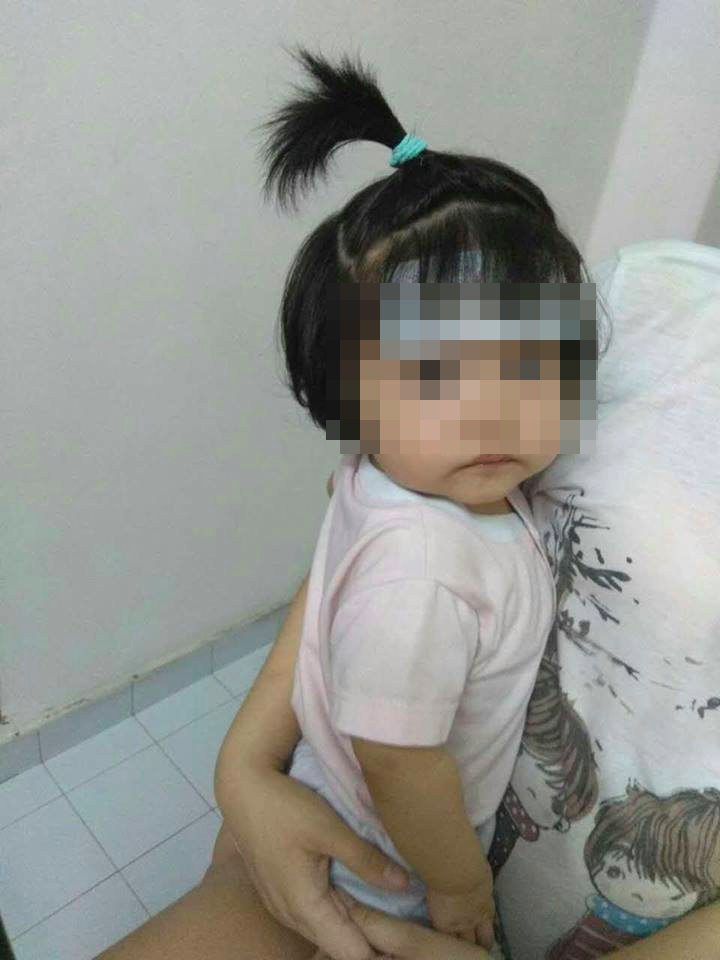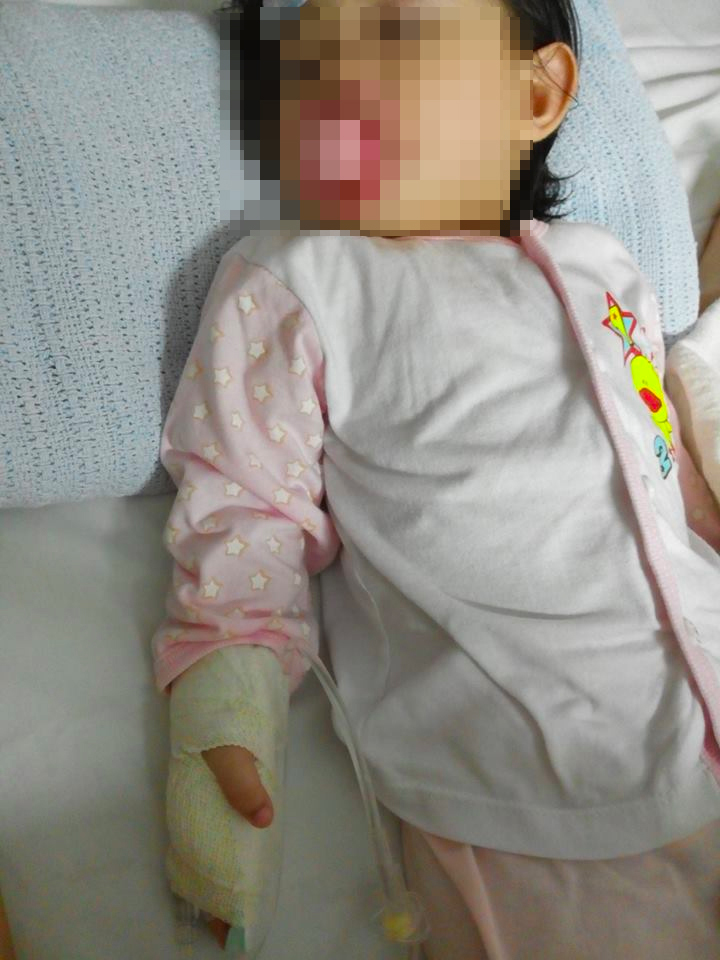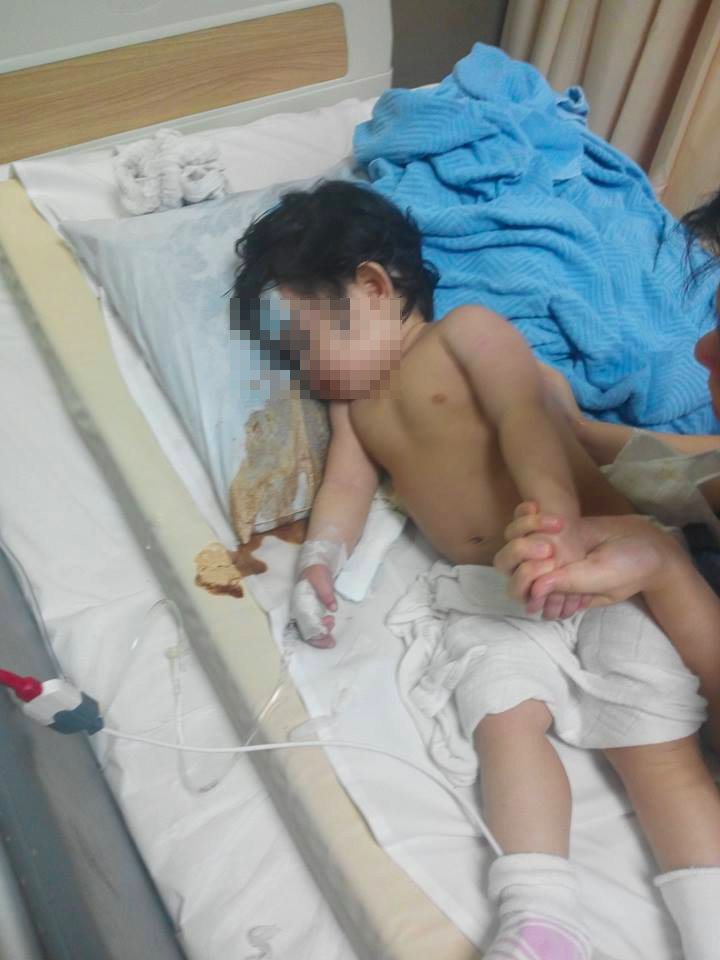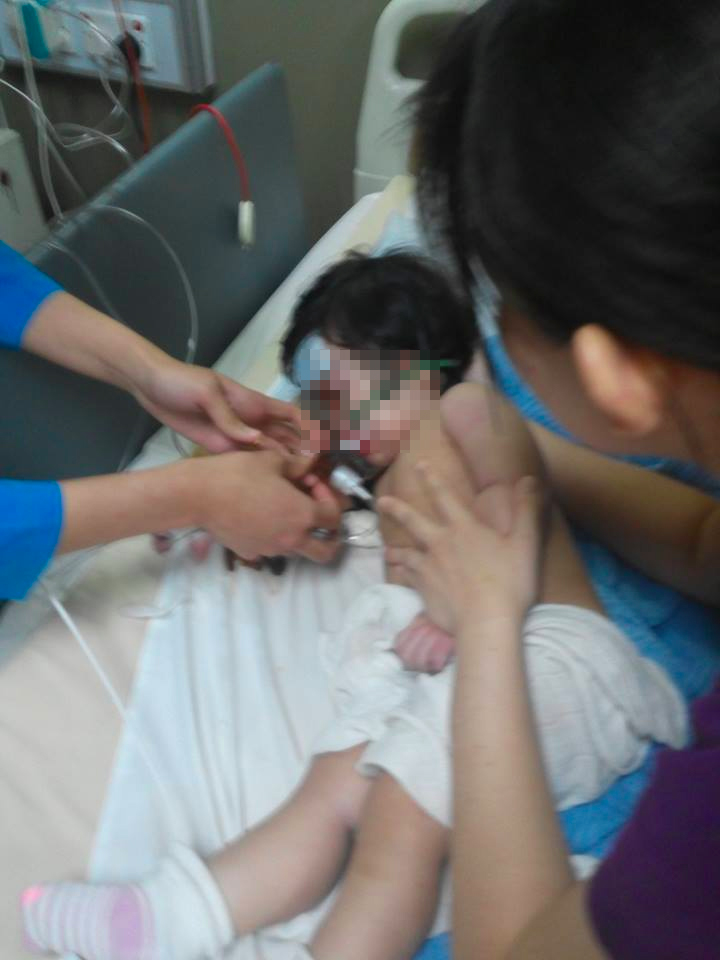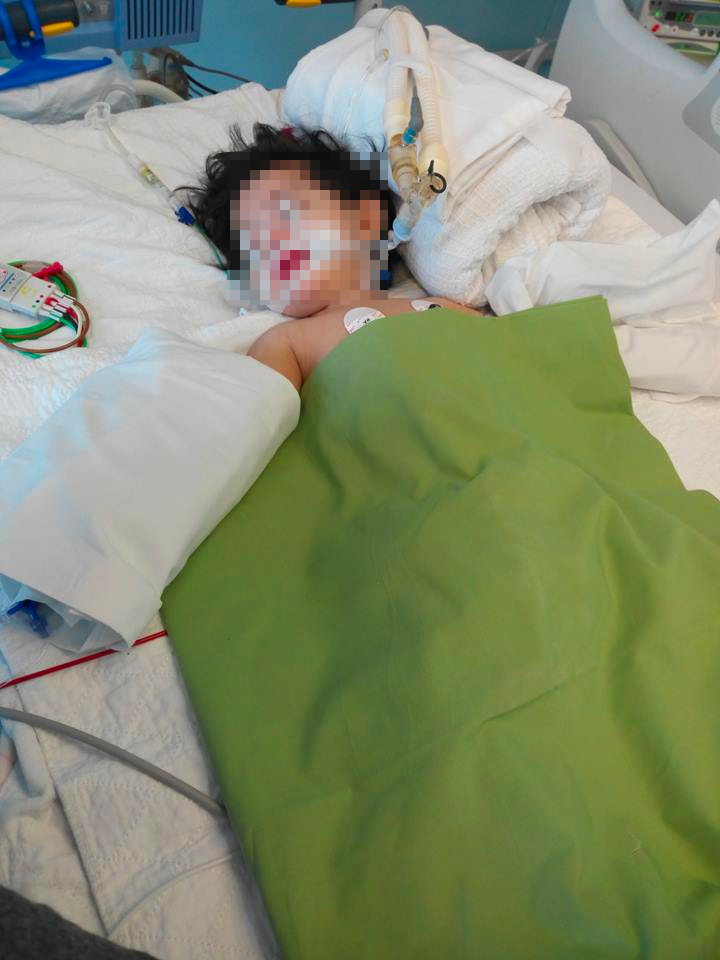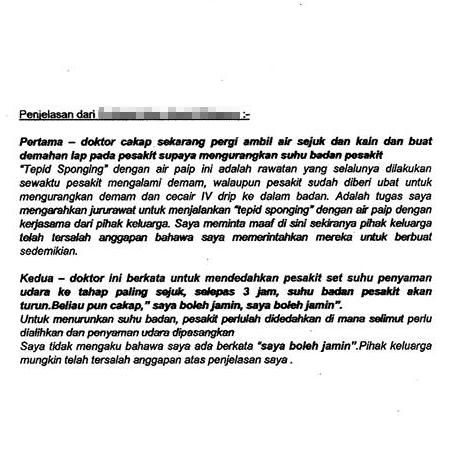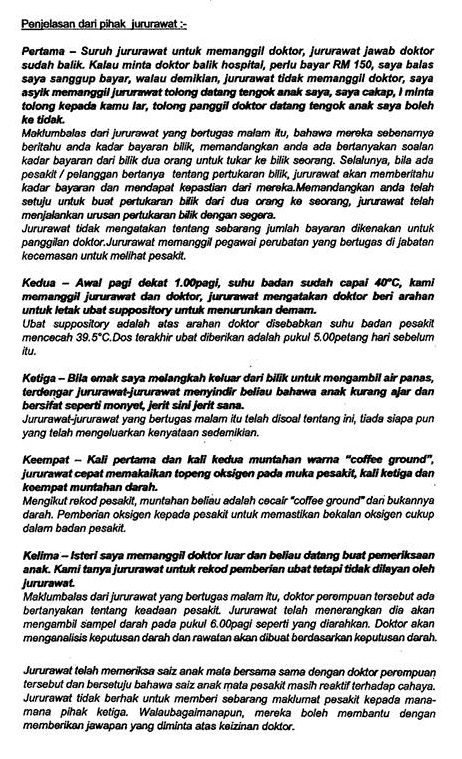A Detailed, Heartbreaking Account Of How This Baby Was Treated In A Private Hospital
The hospital has finally responded with a written reply on the case.
A father who lost his child recently, took to social media to share his heartbreaking experience of sending his child for treatment at a private hospital in Batu Pahat, Johor
Neo Ein Sern recalled that it all started on 24 April, when his 11-month-old daughter, Joel Neo Jo Yee, had a high fever up till 39° Celsius.
After much discussion, he decided to send his daughter to the private hospital for treatment. The little girl was first admitted to the hospital at about 9pm. After some check-ups, it was confirmed that the infant was only having a high fever.
Together with his pregnant wife, Neo spent the night at the hospital with their daughter.
The next morning at about 10.30am, the doctor had administered a few medication to the child through the oral route, injection, and suppository (rectum).
About four hours later, Neo and his family noticed some worrying changes in his daughter - her lips had turned purple while her hands and legs were cold and were turning black
Neo and his family started to panic. They prompted the nurse to call the doctor but the nurse, whom he claimed to be quite nonchalant, kept asking them to wait.
Feeling anxious, his wife became impatient and decided to call a personal friend who is a doctor, to have a look at their child. According to Neo, the friend had already reached the hospital to check on their daughter, but even then, the doctor from the hospital was not there yet.
While waiting for the hospital doctor to come and check on his daughter, Neo, together with his wife and mother, used a hot towel on Joel's hands and legs to keep her warm.
When the doctor finally came to check on their daughter, he said that the infant's condition was due to her fever.
Neo was flabbergasted and couldn't comprehend the explanation given by the doctor, but he decided to trust the doctor nevertheless. He had thought that since his family have decided to admit their baby to this particular hospital, they should trust the doctor here.
The infant's condition stabilised temporarily until at about 5.30pm when her fever worsened
The doctor came and Neo couldn't help but notice that the doctor was about to give his daughter the same medications. Concerned, Neo asked if it was safe for his daughter to take those medications again since she had already taken the medications earlier at 10.30am, which was only 7 hours earlier.
The doctor explained that it is okay and that the infant is being given a stronger medication.
Neo was worried, but since the medication was already administered to his daughter, he decided to trust the doctor.
At about 8.30pm, the family began to notice that there was something wrong with their little girl
Joel seemed to be in a deep sleep and she didn't respond much when they tried to wake her up.
"She only smiled slightly for a moment," Neo said, adding that that was the last time he saw a smile on his daughter's face.
It was around this time that the doctor came for his ward rounds duties, so the family asked the doctor about the child's condition.
The doctor apparently said that the drugs given to the child will cause her to sleep soundly.
"This is the third occasion that I have trusted the doctor."
The baby kept sleeping until about 10pm, and Neo felt uneasy.
"I feel that it's impossible that my baby loves sleeping so much, she is very playful and she wouldn't want to sleep for such a long period of time," he said, adding that the effects of the drug should have worn off over time if she was sleeping because of that.
Once again, Neo approached the doctor to check on his daughter. The doctor said that they would need to monitor her condition for at least a night, and said that it was normal for her to be in such a deep sleep.
At this point, Neo began to contemplate if he should transfer his daughter to another hospital. However, it was already 12am and the soonest they could transfer her out was the next morning.
At about 1am, his child was already experiencing a very high fever that was above 40° Celsius. The family asked the nurse to contact the doctor.
The nurse told them that the doctor had instructed her to give the child a suppository, and they tried to stop her.
However, the nurse stressed that the family have come to seek medical treatment for the infant at this particular hospital and therefore, should trust the healthcare workers to take care of her. After saying this, she administered the suppository into the child's rectum.
Neo had insisted on calling the doctor but he claimed that the nurse repeatedly told him that the doctor has gone home and he would need to bear the cost of RM150 to call the doctor, to which he immediately agreed.
However, the hospital's nurse did not even call the doctor and he kept going back and forth to urge the nurse to check on his daughter.
"I beg you to call the doctor to check on her," he told the nurse.
"When my baby's temperature was at 41.4° Celcius, my family almost lost our minds," he recounted.
Then when he wanted to help his daughter to change the diapers, he realised that her faeces were "flowing out like water".
He immediately ran out to call the nurse to go over to the ward and have a look.
Neo said that the nurse still did not get in touch with the doctor who was attending to his daughter. Instead, the nurse had asked a doctor from the emergency department (ED) downstairs to have a look.
According to Neo, this doctor checked on Joel and then told her family (and not the nurse) to get cold water and damp a towel and put it over the child to keep her cool. Neo and his family kept doing this until 4am in the morning and when Neo noticed that the fever has not subsided, he went looking for the doctor that was supposed to attend to his child.
The nurse still did not contact the doctor in charge and referred to the same doctor from the ED once again.
This time, the doctor was said to have instructed the family to take off the baby's clothing, adjust the air-conditioner to the lowest temperature, and adjust the fan's speed to its highest.
According to Neo, this doctor gave his assurance and "guaranteed" that the child's fever will get better.
Neo was unable to comprehend what was going on and lost control of his emotions at that moment
He kept screaming for the nurse and doctor but nobody bothered or attended to him. His mother then tried to calm him down and told him not to create any trouble since they were at a hospital. She said that they would wait for Joel to wake up and then transfer her to another hospital.
Then, the family decided to contact Neo's friend who came to check on the daughter previously, to once again do so since the doctors in the hospital "did not want to save their daughter".
The friend came to check and felt that there was something that was off. The friend requested to look at the child's medical report to probe further, but the nurse refused and told the friend to wait for the doctor to discuss the matter.
Then at about 6am, a nurse came to draw blood from Joel for a medical test. This was when things had apparently gone from bad to worse.
Joel had begun to vomit out what appeared to look like the colour of coffee, and subsequently, some reddish liquid that appeared to be blood.
Neo said that the nurse knew that something was wrong and took an oxygen mask and put it on the child.
The family cried and screamed in disbelief, wondering how a simple fever could have aggravated to such a tragic situation.
A group of workers from the hospital ran in and out of the ward, while the family stood outside the ward and silently prayed that the child will be well.
Eventually, the child was transferred to the intensive care unit (ICU).
"The doctor came over and told us that our daughter's condition is unstable and would need to transfer her to another hospital," Neo said.
The doctor apparently told the family that the hospital lacked the medical facility needed and they were understaffed. He asked which hospital Neo wanted to transfer his daughter to, and that he would help the family with the procedures.
It was learned that Joel eventually passed away after being transferred to another hospital.
Neo ended his post by saying that he was disappointed that the private hospital has pushed all responsibilities from his child's case with their latest email reply that was sent to him yesterday, 7 June.
A doctor and a medical officer involved, and the director of the nursing department wrote an explanation in regards to his complaint on the service and treatment rendered to Joel
The written explanation from the three individuals addressed a few important issues in the case.
Below are excerpts of the written reply from the doctor:
Why the infant's lips turned purple, hands and legs turned cold:
Doctor: This is caused by the increase in body temperature due to fever. When having a fever, the blood vessels will constrict and reduce the blood flow to 'extremities' parts of the body. Because of this, the skin colour turns pale, feels cold, and the colour of nails and lips will look purplish. It is a temporary condition and the patient will slowly recover when the fever subsides.
Why the infant appeared to sleep longer than usual:
Doctor: A patient that is having a high fever will look more tired and less energetic. When I was doing my ward rounds at 8.30pm (25 April) and at 11.30pm (25 April), the patient appeared to be awake and there were no abnormal symptoms such as a change in neurology. Therefore, no follow-up treatment such as brain scan was required.
Why the infant had vomited blood at 6am (26 April):
Doctor: It is not actually vomiting blood but "coffee ground" that was caused by the stress ulcer that stems from the patient’s condition. The medicine, ‘Pantoprazole’ was given through injection to reduce this stress ulcer.
Why a transfer from the hospital was not made during her admission, but only much later when her condition had become more critical:
Doctor: I was not the doctor on duty when the patient was first admitted to the hospital, so I cannot make a decision on whether I can accept or transfer the patient. My first check-up on the patient was at 9.30am (25 April), whereby the patient did not display any clinical signs of being in a critical condition and the lab reports showed the same.
During early morning on 26 April, the patient's condition started deteriorating and we transferred her to the ICU to stabilise her condition. The doctor had inserted the breathing tube into the patient's mouth and connected it to the ventilator machine to help the patient breathe.
At that time, I have given the explanation that the reason for the transfer is due to the fact that we lacked the skill sets in terms of taking care of children that are "ventilated".
I contacted the paediatrician at the Hospital Sultanah Nora Ismail (HSNI) as reference and the case was accepted. I ushered the patient into the ambulance until we arrived at HSNI. There, the case was taken over by the paediatrician on duty.
Why Acute necrotizing encephalopathy of childhood (ANEC) was not detected earlier at this hospital:
Doctor: ANEC can only be diagnosed through a radiology test, whereby a confirmation has to be done through a brain CT scan or MRI. The test was not done here because there was not a single sign of neurological change before the patient’s condition deteriorated. Generally, children that are diagnosed with ANEC do not display any specific signs and the neurological deteriorations are very rapid.
This was what the medical officer on duty replied:
Doctor said to take cold water and cloth and dab it on the patient to bring down the patient’s body temperature
Medical officer: 'Tepid sponging' with pipe water is a treatment that is often given when a patient is having a fever, even when the patient has already been given medication and liquid IV drip into the body. It is my duty to instruct the nurse to carry out tepid sponging with pipe water with the cooperation from family members. I apologise here if the family have misunderstood that I have instructed to do so.
This doctor said to expose patient and set the air condition temperature to its coldest, after three hours, the patient’s body temperature will go down. He also said, "I can guarantee, I can guarantee."
Medical officer: To cool down the body temperature, a patient will have to be exposed whereby the blanket has to be removed and the air-conditioner switched on. I deny that I said, "I can guarantee". The family have perhaps misunderstood my explanation.
This was the explanation from the director of the nursing department:
Ask nurse to call doctor, nurse said that doctor has gone back. If ask doctor to return to hospital, need to pay RM150, I said I am willing to pay, but nurse didn’t call doctor, I kept calling nurse to help to see my child, I said, "I plead for your help, call the doctor to see my child."
Director of nursing: According to a nurse that was on duty that night, the nurses only told you about the charges for the ward, seeing that you asked a question about the charges for a two-person room to change to a single-person room. Usually, when a patient or customer asks about room transfers, the nurse will tell them the charges and get a confirmation from them. Seeing that you agreed to make the room transfer from two-person to a single person, the nurse had immediately made the transfer. The nurse did not state anything about charges imposed to call a doctor. The nurse called a medical officer that was working at the emergency department to check on the patient.
First and second time the vomit was "coffee ground" colour, the nurse quickly put on an oxygen mask on patient’s face, the third and fourth time vomit blood."
Director of nursing: According to the patient’s medical record, the patient's vomit was liquid "coffee ground" and not blood. Giving the oxygen to the patient was to ensure that there was enough oxygen supply in the patient’s body.
Note: "Coffee ground" refers to 'coffee ground vomiting', as the vomit may appear black or dark brown like coffee grounds, as the name suggests.
Read the full explanation here:
